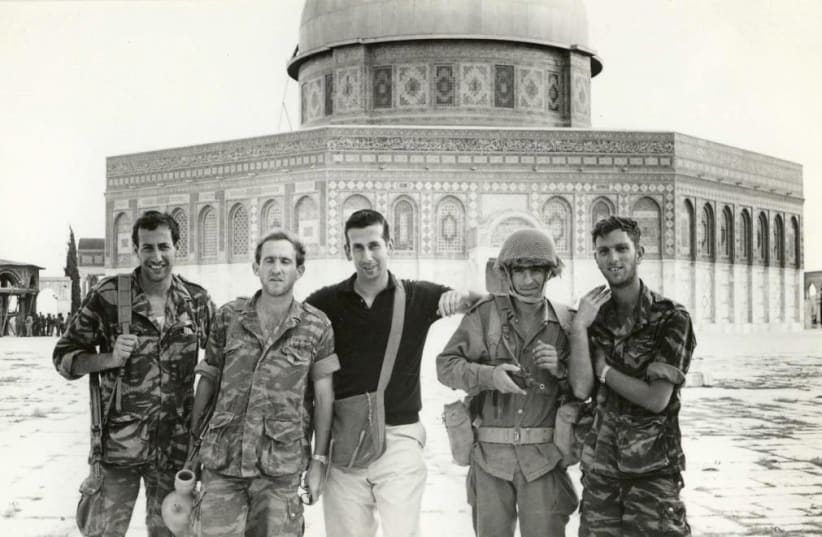It is June 1967. Israel is a fledgling 19-year-old state, haunted by the Holocaust, surrounded by Arab states calling for its destruction, their armies mobilized and ready. Yitzhak Rabin, then the IDF chief of staff, fears that 10,000 people may be killed in a war, while then-defense minister Moshe Dayan imagines that figure will be tens of thousands. The public fears genocide.
Instead, the Six Day War ended in a dramatic victory, with Israel now in control of territory three times its size and the strategic depth it had so desperately lacked. Extinction ceased to be an imminent threat and Israel and the entire Jewish people let out a collective sigh of relief. Moreover, for the first time in 2,000 years, since the expulsion by the Romans, all of Jerusalem, the heart of Judaism and focal point of the Jewish saga, was in Jewish hands. The war appeared to be a case of national redemption.
For today’s readers, especially those who have come of age in recent decades, in which Israel no longer faced a threat of invasion by Arab armies, it is difficult to comprehend the existential fears of the young Israel of 1967 and the euphoria that swept it and the Jewish people. Decades of highly charged, often misinformed, debate about the future of the West Bank make it almost impossible.
Abraham Rabinovich’s Battle for Jerusalem is a throwback to an earlier, simpler and more naïve era in Israel’s history. The enemy and threat were unambiguous and the national consensus unassailable. We knew clearly who was right. A highly acclaimed book when first published in 1967, it celebrated the victory that Israel and the Jewish people so desperately needed in the early decades after Israel’s rebirth and the Holocaust. It has now been republished in a 50th anniversary edition, supposedly updated to reflect the decades that have since passed.
The book is dense, containing more than 400 pages of individual encounters, of each enemy force and fortification overcome. It is a story of dramatic individual initiative and heroism, of the informal, loose-knit, almost familial Israel of the early years, of the agonizing tension of the infamous “waiting period,” the door-to-door mobilization of the reserves and the ultimate victory, but also of the agony of battle.
Rabinovich has an unusual ability to bring the reader into the scene of battle. Many of the descriptions are so vivid one can imagine oneself advancing with IDF forces, the stench and sounds of battle all around. He describes each stage of the battle for Jerusalem in painstaking detail, based on endless vignettes and personal stories. Accounts of the war, especially the battle for Jerusalem, swept readers’ imaginations at the time and some, e.g. the bitter battle for Ammunition Hill and conquest of the Old City, are fascinating to this day.
Most readers today, however, even those interested in military affairs, myself included, will probably find it far too detailed and the endless vignettes ultimately tiresome. Moreover, the book makes little mention of the strategic context in which the war broke out, or of Israel’s decision-making process. Nor does it address the historic ramifications of the war for Israel. As such it is something of a “feel-good” timepiece from a different era.
The book’s title, The Battle for Jerusalem: An Unintended Conquest already hints at part of the problem. When the war broke out, Israel did not plan on conquering all of the Sinai, just part, nor the West Bank and Golan Heights, and events took on a momentum of their own. Certainly no one at the time could have foreseen that Israel would still be in control of the latter areas 50 years later. How the fighting evolved into a far broader and unintended war is mentioned only in passing.
Nor does the book address the war’s historic ramifications for Israel. On the one hand, it contributed greatly to the process of growing Arab acceptance of Israel’s existence, if not its legitimacy, which further gelled following the Yom Kippur War. Prior to 1967, the Arab world had convinced itself that the defeat in 1948 was an historic aberration that would be “corrected” with Israel’s future destruction. The Six Day War, however, made it clear that Israel was here to stay and led to a fundamental change in Arab war aims, from Israel’s destruction, to restored control over the territories lost and thus to a moderation of the overall conflict. As such, it also contributed to the later peace with Egypt and Jordan.
Conversely, the ongoing West Bank morass may be the war’s greatest legacy. The Arab refusal to negotiate in the years following the war led to Israel’s long-term occupation of the West Bank and provided the setting in which the right-wing forces within Israeli society could emerge and establish the settlements. Some 50 years later, Israel’s greatest victory is also the source of the only existential threat it now faces, how to preserve its Jewish and democratic character in the face of inexorable demographic trends. The Palestinian population of east Jerusalem, some 300,000 people, makes a re-division of Jerusalem essential.
These issues are not addressed in this wartime account. For those who wish to get a sense of the heady days of June 1967, however, and of the dramatic battle for Jerusalem, the book will make an interesting, if challenging, read.
The author, a senior fellow at Harvard’s Belfer Center, was a deputy national security adviser in Israel. He is the author of the forthcoming Israeli National Security: A New Strategy for an Era of Change.
